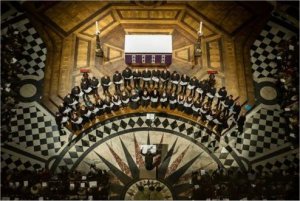
 E PHILADELPHIANS had a rare privilege this week. After two days of snow, our “Concerts at the Cathedral” series brought to our city the legendary Tallis Scholars as part of their 40th Anniversary Tour. They were every bit as magnificent in person as they are on recordings.
E PHILADELPHIANS had a rare privilege this week. After two days of snow, our “Concerts at the Cathedral” series brought to our city the legendary Tallis Scholars as part of their 40th Anniversary Tour. They were every bit as magnificent in person as they are on recordings.
In reading the program beforehand, I was pleased to see Victoria’s Missa Gaudeamus among the selections to be performed. I was surprised, however, to notice that the Credo had been omitted. It was a thrill when, after the Gloria, the singers began the Credo anyway. So much for the program; maybe the text was too long to fit on the page.
After my initial thrill at hearing the intonation of the Credo, I began to relax and enjoy the movement. What struck me was nothing technical. I was not processing the inner harmonies or dynamics of the music. Rather, I felt invited to meditate on the mysteries of the faith.
As the Credo slowly proceeded, I had time to consider each of the tenets of faith included therein. In my normal weekly recitation of the Nicene Creed, there is hardly time for such meditation and consideration. It was a welcome Advent gift.
What if we had this opportunity every week at Mass? Most of the Mass-goers I know wouldn’t see it this way, but I would consider it such a blessing. To sing or chant the Creed at all is a rarity in the average parish, but to have a polyphonic setting of the Creed would be outright unthinkable in most places.
The experience I had on Tuesday evening wasn’t in the context of liturgy, but I was grateful for the moments of unhurried mediation I had under the guidance of Victoria and the incomparable Tallis Scholars.
